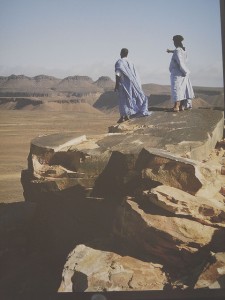
[Men Facing Sahel Desert by Nawal_ Under CC license on Flickr "]
D. Evariste Ouédraogo wrote the following about they way politicians always try to spin food crises in Niger in a way that would put them in a more favorable light [fr]:
En 2005, les autorités avaient toujours tenté de convaincre l’opinion que la menace de famine était une simple rumeur malveillante, déshonorante. [..] Quelques jours après, son Premier ministre (PM), dans des propos non moins fallacieux, appelait pourtant à l’aide, la Communauté mondiale, pour cause de …famine [..] Aujourd’hui, la vérité est toute nue : dix jours seulement après le changement de régime au Niger, on apprend, dans une déclaration télévisée du chef de la junte au pouvoir, que la famine “menace l’existence de millions de Nigériens dans quasiment toutes les régions”. Le déficit en vivres est alors estimé à 400 000 tonnes. Tout le contraire donc des péroraisons de Mamadou Tandja, qui était allergique à l’idée de risques de pénurie alimentaire.
In 2005, the authority tried to convince the opinion that the threat of famine was only a shameful rumor [..] A few days later, the prime minister, in no less fallacious terms, still asked for help the international community because of...famine. in 2010, the truth comes out again: 10 days after the change of regime in Niger, we learn from the chief of the military junta on television that famine threatens millions of Nigeriens from all over the regions. The shortage of food was estimated at 400 000 tons. Total opposite of the statement by Mamadou Tandja who was allergic to the idea of food crisis.
Grioo.com asks out loud the tough but conspicuous question that many Nigeriens wonder about: "where did the cash influx from the Uranium trade go?" [fr]:Qu’on se rappelle les tiraillements entre l’ex-chef de l’Etat du Niger et les premiers responsables d’AREVA à propos du renouvellement des contrats d’exploitation de l’uranium. [..] On ne dénoncera jamais assez ces slaloms qui permettent à des délinquants à col blanc d’extorquer impunément les fonds publics qui devraient servir à sauver de nombreux concitoyens en manque de nourriture, d’eau et de soins de base. Les masses d’argent tirées des ressources minières ne profitent généralement pas à la majorité silencieuse. Un paradoxe africain qui n’étonne guère. Mais aussi un scandale qui doit prendre fin en ce début de millénaire. A croire que les ressources minières n’apportent que misère aux populations africaines. Et il en sera tojours ainsi tant qu’elles ne seront pas utilisées à développer les cultures céréalières.
Let's remember the tension between former heads of state in Niger and the leaders of Areva about the renewal of uranium exploitation contracts [..] We will never denounce sufficiently all these slaloms that allow white collar delinquents to embezzle public funds that should contribute to helping citizens who lack food, water and basic health care. The amount of money from mining resources never benefit the silent majority. An African paradox that does not surprise anymore. However, this scandal must end now at the beginning of the millennium. It's almost as if mining riches only brings misery to African population. It will always be the case until the resources are not used to develop grain fields.
Kathryn Richards at Care shares a few thoughts and testimonies on the "hungry season" as the rural population finds itself in dire needs of animals to herd:Niger is a country of contrasts. Rich in newly found uranium and oil but its people crushingly poor. [..] Food is readily available in the market – but at an inflated price few can afford. Families are selling off their livestock at reduced prices to buy food. Mohammed Gusnam was one of these people: "It is difficult. As herders we were like princes, proud. Now the pasture land is disappearing and we are stuck in the village. The village is like a prison to me."The current response to the food crisis, however, seems to be speedier than in 2005. Cyprien Fabre, head of the regional bureau of the European Commission Humanitarian Aid (ECHO) offers the following assessment [fr]:
Des mécanismes d’alerte précoce et d’intervention sont en place dans la plupart des pays touchés, et des fonds ont été alloués rapidement. Les opérations sont en bonne voie au Niger, au Burkina Faso et au Mali. Le Tchad a besoin de plus d’acteurs pour une intervention efficace.
Many alert and intervention systems are in place for most affected countries and funds were allocated accordingly. Operations are well underway in Niger, Burkina-Faso and Mali. Chad needs more agents for an efficient intervention.
Still many organisations believe that the resources are still too slow to arrive. They identify two reasons for the delay: 1) making sure that donors are coming through with funding and 2) the challenges of reaching the population in the most remote areas. Many think that cash disbursement might be faster and more effective for the short run than sending food [fr]:Au cours de discussions avec les membres des communautés, davantage de personnes ont dit préférer les espèces aux semences. Les communautés ayant accusé les pertes de récoltes les plus importantes ou qui vivent plus loin des marchés tendent à opter pour les semences ; celles qui ont accès aux marchés, ont accusé des pertes de récoltes moins graves, ou ont un accès limité aux terres tendent au contraire à privilégier le cash.
During conversations with the members of the communities, more people said that they'd rather have cash than seeds. The communities that had lost the most crops or those who live the farthest from markets tend to choose seeds; those who have access to markets have not lost as much or those who have limited farming lands tend to favor having cash.
======
Cross-posted at Global Voices
======
Cross-posted at Global Voices

Hey cool weblog, just wondering what anti-spam software you use for comments because i get lots on my blog. Anyway, in my language, there should not much good supply like this.
ReplyDelete